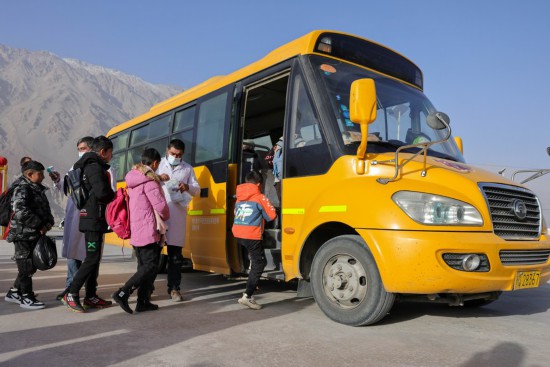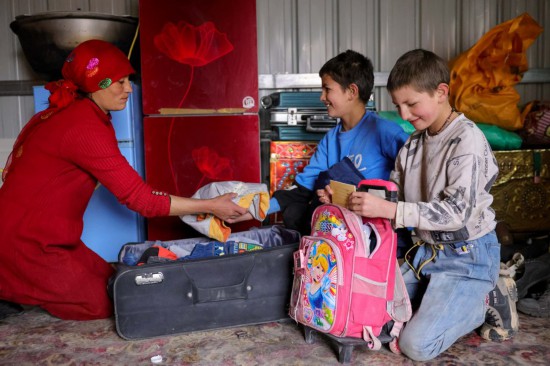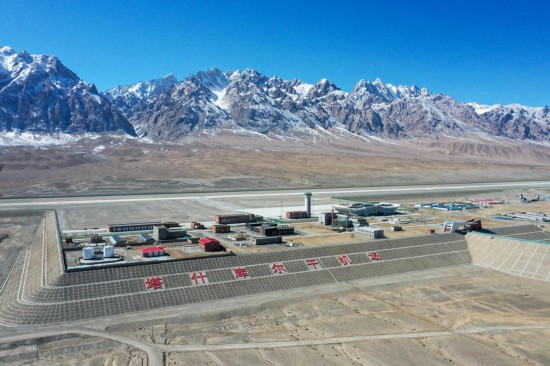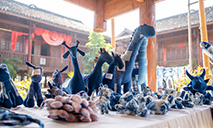Better education gives wings to children in Xinjiang's remote areas
* After a six-hour journey, a yellow school bus took 11-year-old Ayizmal Mirzjan and her friends to their boarding school in the Taxkorgan Tajik Autonomous County, northwest China's Xinjiang Uygur Autonomous Region.
* Easy as it seems today, the 250-km trip used to take several days on a horse or camel.
* In 2008, Taxkorgan adopted a school policy whereby all the students enjoy free education for up to 15 years from kindergarten to high school. The development of education in the county epitomizes that in Xinjiang as a whole.
URUMQI, March 19 (Xinhua) -- One day ahead of the spring semester, 11-year-old Ayizmal Mirzjan and her friends left their home village deep in the mountains of the Pamir Plateau for school.
It was the first time that the students boarded a standard yellow school bus, the same as the ones they saw in movies. After a six-hour journey, the bus took the little passengers to their boarding school at the county seat.
Easy as it seems today, the 250-km trip used to take several days on a horse, camel or motorcycle.

Students receive body temperature checks and get masks before taking a school bus in the Taxkorgan Tajik Autonomous County, northwest China's Xinjiang Uygur Autonomous Region, on Feb. 25, 2022. (Xinhua/Ding Lei)
Upon the departure, Ayizmal Mirzjan's cousin Zyatm Mayir took a selfie by the school bus and posted the picture on social media. "If only I could be as young as Ayizmal Mirzjan and go to school by such a comfortable school bus," she wrote on her WeChat account.
SCHOOL ON HORSEBACK
Ayizmal Mirzjan's village Reskam, which means "land with ores" in the Tajik language, is a border village located in the southwesternmost part of the Taxkorgan Tajik Autonomous County, northwest China's Xinjiang Uygur Autonomous Region.
At an altitude of over 3,000 meters, with several major rivers and mountains stretching through, the village used to see its residents' settlements scattered in a dozen of relatively inhabitable valleys.
The complex landscape had restrained the accessibility to education for the children of Reskam for generations, including elder members of Ayizmal Mirzjan's family.

Aerial photo shows a school bus running on the mountain road in northwest China's Xinjiang Uygur Autonomous Region, on Feb. 25, 2022. (Xinhua/Ding Lei)
Jamlhan Yantonghan is a retired teacher in Reskam. Having worked in the village for over 30 years, Jamlhan Yantonghan called himself a mobile "primary school on horseback."
There was a time when he had to travel on a horse all across the vast pasture, visited the scattered households from door to door, found as many students as he could, and gathered them for class. Their classroom could be in a yurt, on a grassland, or even by a cliff.
It was not until the 1980s that the village established a proper school with classrooms and dormitories, Jamlhan Yantonghan recalled.
The school ignited a passion for education among Reskam's students. However, it soon occurred to the villagers that access to quality and modern education still seemed out of reach in such a remote village.
In 2008, Taxkorgan adopted a school policy whereby all the students enjoy free education for up to 15 years from kindergarten to high school, and students from fourth to sixth grade can attend the boarding school in the county seat.

Aerial photo shows a school bus running on a bridge in northwest China's Xinjiang Uygur Autonomous Region, on Feb. 25, 2022. (Xinhua/Ding Lei)
PAVING A WAY TO SCHOOL
However, the road to school has always been challenging for Reskam's students.
Over 20 years ago, Ayizmal Mirzjan's father attended the school in Reskam, which only gave lessons up to sixth grade. Like most of his peers, he did not continue with his education afterward.
Even five years ago, as Chen Jingquan, an officer at a police station along the route to the county seat recalled, once when a snow disaster struck, the students had to get out of the car and trekked 18 km across the snow-capped mountain peak, and then got in another car waiting for them at the other side.
Having escorted thousands of students over the past eight years, Chen knows all too well the difficulties: students had to navigate a perilous journey -- two 5,000-meter-high mountain peaks, a single-lane way built on the cliff right along the roaring Yarkand River, and snowfields -- before making their way to school.
Thanks to a construction project with an investment of 1 billion yuan (about 157.7 million U.S. dollars) in 2019, the road to and from the county seat has been renovated, while a tunnel that bypasses the two mountain peaks is scheduled to open to traffic by the end of this year.

Children prepare to leave their home for a boarding school, in Reskam village of the Taxkorgan Tajik Autonomous County, northwest China's Xinjiang Uygur Autonomous Region, on Feb. 24, 2022. (Xinhua/Ding Lei)
Now, with 14 school buses put into operation this year, students in Taxkorgan can enjoy safe and comfortable journeys free of charge, which their past generations could hardly imagine.
OUT OF THE MOUNTAINS, AND BEYOND
In the past eight years, the county has invested more than 200 million yuan to improve school conditions. The enrollment rate of primary and secondary schools in Taxkorgan has increased from 75 percent in 2006 to 100 percent at present, and the university admission rate surged from 48 percent to 100 percent in 2021.
In addition to free schooling and dining, the 2,669 students in Ayizmal Mirzjan's boarding primary school can now have classes simultaneously with students from developed places of the country via a distance education system.
The development of education in Reskam epitomizes that in Xinjiang as a whole. The vast region has numerous towns and villages just like Reskam, where daily commutes between home and school would be very difficult for some students.
Therefore, attending a boarding school has become a common practice for students, and it is up to students' parents to decide whether to board or not. This education system not only ensures the quality of education but also eases the burdens on parents.
"Now, there are more ways out for children, and their ideas and horizons have been greatly broadened," Jamlhan Yantonghan said. "The saying that knowledge can change your fate will never go out of date."
Apart from free transportation and schooling, local education authorities also organize free vacation activities to broaden the students' horizons. Each year, 70 to 100 students from Taxkorgan, especially its remote villages, are taken on a summer camp to Shenzhen, a metropolis in south China, according to Molahabifu, deputy director of Taxkorgan's education bureau.
The children have become more confident and outgoing, said Molahabifu, adding that some are still in touch with their peers in Shenzhen years after the summer camp.

Aerial photo shows the Taxkorgan Airport under construction in northwest China's Xinjiang Uygur Autonomous Region on Feb. 27, 2022. (Xinhua/Ding Lei)
In June this year, the construction of the Taxkorgan Airport, the highest-altitude airport in Xinjiang, is scheduled to complete, connecting the students to an even wider world.
Wang Lu, who has been teaching in Taxkorgan for 10 years, has noticed that with better education and more opportunities, students in Taxkorgan now dare to dream bigger.
"Ten years ago, most of the children would only think about being a shepherd or getting married and starting a family when talking about future. Now, their dreams have become as colorful as being an athlete, a model, even an astronaut," said Wang.
Photos
Related Stories
Copyright © 2022 People's Daily Online. All Rights Reserved.










